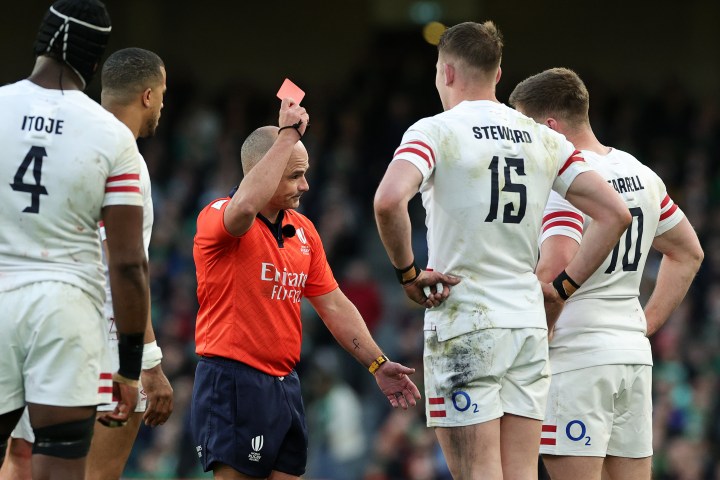COLLISION COURSE
Rugby’s battle for better player safety is trumping common sense

Last weekend’s red-card incident involving England fullback Freddie Steward, Irish opposite number Hugo Keenan and South African referee Jaco Peyper has underlined the complex nature of balancing ‘safety’ versus common sense.
It was almost with a sigh that South African referee Jaco Peyper dismissed England fullback Freddie Steward, briefly explaining that “under the current climate” it was a red card.
In case you missed it, Steward had about 0.3 of a second to somehow avoid contact with Ireland fullback Hugo Keenan, who had scooped up a bouncing ball during the Six Nations clash between Ireland and England.
Keenan ducked down to collect the ball and Steward, who was running at pace to cut the space, appeared to try to adjust his body just before the inevitable impact.
Watch the incident:
He remained upright, but turned his body with arms tucked at his side, and the committed Keenan’s face met Steward’s elbow with a high degree of force. Quite how Steward was supposed to vaporise to avoid the clash remains a mystery.
Peyper had to follow protocols. Was there head contact? Yes. Was there a high degree of force? Yes. Was it dangerous? Yes. Was it reckless? Maybe. So far, so red. Until the question of were there mitigating circumstances that led to the clash? No, said the officials, including television match official (TMO) Marius Jonker in the booth.
That was curious. Keenan, more than Steward, altered his running direction and body height at a very late stage. To say there was no mitigation seemed bizarre. That might have reduced the outcome to a yellow card and the match result, and the outcome of the entire Six Nations championship might have been different.
But Peyper was operating in a very narrow framework that is highly prescriptive with severe consequences. In the heat of the moment the officials didn’t think there was enough mitigation to save Steward.
Visit Daily Maverick’s home page for more news, analysis and investigations
Remember when Pieter-Steph du Toit was red-carded against France after being pushed by a teammate, causing him to stumble clumsily into a ruck where he made contact with Jonathan Danty’s head? Mitigation wasn’t considered then either.
If the Steward incident was reckless, and there was force to the head by Steward on Keenan, then Peyper appears to have done the right thing. Yet a World Rugby committee had effectively said that mitigation trumps reckless behaviour.
Read more in Daily Maverick: “Rugby targets its existential crisis with further trials to lower tackle heights”
Going back to Du Toit’s incident against France – there was mitigation despite the incident being reckless. That card was not rescinded. It underlines the point that inconsistency in the application of laws, even those fairly clear-cut, is ruining the game.
On Wednesday a disciplinary committee assessing Steward’s punishment (because red cards always lead to some sort of suspension), rescinded the red card.

Ireland fullback Hugo Keenan runs with the ball during the Six Nations match against England. (Photo: David Rogers / Getty Images)
That made Peyper’s decision look worse than it was. He was simply operating under the protocols given to him, with mitigation being just one aspect of the process. After going through the checklist, he made the call that Steward deserved red.
“The committee acknowledged that match officials are required to make decisions under pressure and in the heat of a live match environment,” the ruling read.
That means Steward is free to play club rugby this weekend, but it doesn’t change the fact that England played the entire second half with 14 men, making Ireland’s winning task that little bit easier.
Law and justice
“Player safety” has become the top phrase for rugby’s lawmakers and for good reason – there is already one huge class action suit against World Rugby, the Rugby Football Union (RFU) and Wales Rugby Union (WRU).
But how long will it be before a sponsor, a franchise, governing body or a private equity partner files a lawsuit against World Rugby because an incorrect refereeing decision leads to a team being eliminated from a crucial competition, having been reduced to 14 or fewer players?
It might sound far-fetched, but when the cost could run into millions of dollars of lost revenue, it will become tempting to seek compensation in some form.
Peyper’s decision has already been corrected by an independent panel assessing the incident. In the heat of the moment, he made a tough call based on the evidence he had.
Because of the way officials are being instructed to apply the laws, the second he saw force to the head, and he thought it reckless, regardless of how it happened, he was already leaning towards a red card. None of his fellow officials, that we heard publicly at least, offered an alternative opinion and so the outcome was inevitable.
Which is where the law can be an ass.
Collision sport
Rugby remains a full-contact sport, played in suffocating spaces, at times at very high speed, between conditioned athletes. By its nature, rugby is a collision sport. When collisions happen people can sometimes be hurt.
Rugby’s custodians have a duty to the players to ensure that as far as they can, the nature of those collisions fits into a legal framework. But the rugby field isn’t a court of law and in real time the legal framework can be too rigid when more time is given to weighing up the balance of probabilities of how an incident occurred.
It seemed clear to most watchers that Steward did not maliciously collide with Keenan in an attempt to cause injury. The subsequent rescinding of the red card proves it legally as well. But the committee agreed it was reckless of Steward, which sends a confusing message to officials.
But Keenan was injured and missed the rest of the match and possibly a few more as a result. Perhaps justice would have been 10 minutes in the sin bin for Steward.

England fullback Freddie Steward was shocked by his red card. (Photo: David Rogers/Getty Images)
The outcome was unfortunate and that might have influenced officials, already heavily primed to act against any blow to the head, regardless of the situation.
In the scurry to protect player safety it seems officials are losing the “feel” for the game.
Nigel Owens, widely considered one of the best referees in the sport, was able to navigate rugby complex laws with a good feel for the game. Coaches would sometimes grumble that he was too lenient at enforcing rugby’s myriad breakdown laws, but even if he was, the big games he controlled tended to have a good flow.
That ability to see the game and control it firmly, maintaining its character, is a dwindling trait. Given rugby’s complex laws and hundreds of actions per game, it’s impossible that a referee will get it right all of the time.
But the sport has to avoid a situation where officials are paralysed in the face of visual evidence because of player safety. Or they are being undermined afterwards when they appear to have applied the law correctly.
No one wants players to be deliberately injured through acts of foul play, but sometimes mistakes happen because of the actions of two players. It seems unjust that just one team was punished for it or that officials are hung out to try when they followed the protocols. DM




















That was a Yellow card at worst. Poor reffing.
“He was simply operating under the protocols given to him, with mitigation being just one aspect of the process. After going through the checklist, he made the call that Steward deserved red.” All we want is consistency from all officials and apply the same rules to all teams. The other officials and TMO could have added their advice as well, if Steward was on the receiving end of the knock to the head would the same debate have been applied after the fact?
I agree wholeheartedly with the general proposition of the article, but I think the red on Steward was correct. He should have seen the situation and developing and made more of an effort (preemptively) to avoid the contact. There’s no reason at all why he couldn’t have done so.
The reason is that rugby is a competitive sport. How long can you remain in the national side, if you are seen to not be trying your hardest to get the ball?
In a game with so many rules, we are never going to get every call right. And while the intention is to improve player safety, there are always going to incidents that can be found to be illegal afterwards because of the availability of better imaging. I support sending a red card off but being allowed to substitute from the bench. Review the decision post match when there is time and calmness, and decide whether to uphold or, as in this case, rescind the decision. Make the process work, not try and reach for the impossible-people are not infallible.